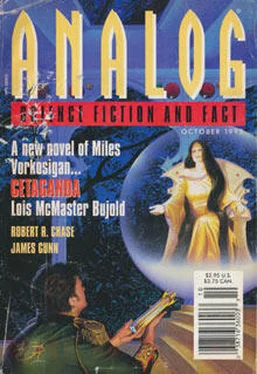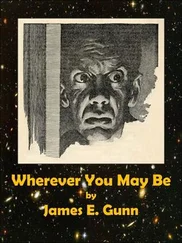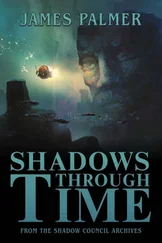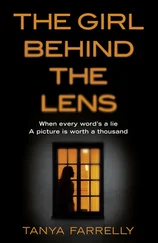James Gunn - The Lens of Time
Здесь есть возможность читать онлайн «James Gunn - The Lens of Time» весь текст электронной книги совершенно бесплатно (целиком полную версию без сокращений). В некоторых случаях можно слушать аудио, скачать через торрент в формате fb2 и присутствует краткое содержание. Год выпуска: 1995, Издательство: Dell Magazines, Жанр: Фантастика и фэнтези, на английском языке. Описание произведения, (предисловие) а так же отзывы посетителей доступны на портале библиотеки ЛибКат.
- Название:The Lens of Time
- Автор:
- Издательство:Dell Magazines
- Жанр:
- Год:1995
- ISBN:нет данных
- Рейтинг книги:3 / 5. Голосов: 1
-
Избранное:Добавить в избранное
- Отзывы:
-
Ваша оценка:
- 60
- 1
- 2
- 3
- 4
- 5
The Lens of Time: краткое содержание, описание и аннотация
Предлагаем к чтению аннотацию, описание, краткое содержание или предисловие (зависит от того, что написал сам автор книги «The Lens of Time»). Если вы не нашли необходимую информацию о книге — напишите в комментариях, мы постараемся отыскать её.
The Lens of Time — читать онлайн бесплатно полную книгу (весь текст) целиком
Ниже представлен текст книги, разбитый по страницам. Система сохранения места последней прочитанной страницы, позволяет с удобством читать онлайн бесплатно книгу «The Lens of Time», без необходимости каждый раз заново искать на чём Вы остановились. Поставьте закладку, и сможете в любой момент перейти на страницу, на которой закончили чтение.
Интервал:
Закладка:
The Lens of Time
by James Gunn
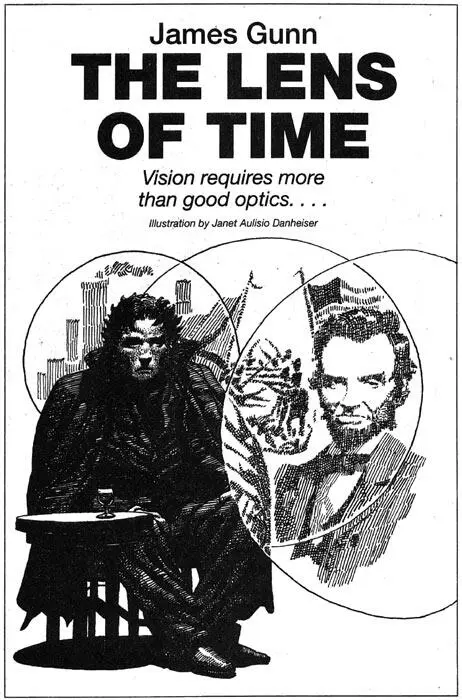
Illustration by Janet Aulisio Danheiser
W here they beheld only a drop of rain slowly rolling down the window-glass, I saw a universe of beings animated with all the passions common to physical life, and convulsing their minute sphere with struggles as fierce and protracted as those of men.
Broadway swarmed with life like water in a stagnant pond. Scarlet and yellow omnibuses raced through the open parts of the street and locked wheels where it was narrower. At irregular intervals they stopped to discharge passengers. When the passengers stretched their hands through a hole in the roof to pay the conductor his ransom for release, he pulled a cord that opened the door and deposited them in a sea of slippery mud, to run a gauntlet of cart wheels and horses’ hooves, before they could reach the relative safety of the pavement next to the buildings. Loaded stages stopped in front of hotels such as the Astor House or the St. Nicholas. Railway cars holding as many as thirty persons and drawn by two or even four horses came down the side streets. All these among the carriages, the commercial wagons, and the foot traffic contributed to the clutter and the crush. Next to the buildings or leaning over into the gutters were boxes, buckets, lidless flour barrels, baskets, decayed tea chests, rusty iron pans, and earthenware jars full of ashes and vegetable refuse. All contributed their share of foul odors to that of the horse dung steaming in the ankle-deep mire of the street.
The man in the black cloak stood at the comer of 8th street and Broadway looking at the turmoil around him with the observant gaze of a scientist, absorbing the scene as a panorama before isolating the individual parts and analyzing them. What passed him was a polyglot mix of workmen and gentry, settled citizens and confused immigrants with their bundles of clothing hung over their backs. Some spoke American English, but many conversed in German and others in English transformed in Ireland into music.
In all that confusion of traffic and appearance and dress, no one paid any attention to the man in the black cloak. He picked his way down Broadway, staying close to the buildings to avoid being splashed by the on-rushing vehicles and horses, and worked his way around heaps of refuse, until he reached Jones street. His eyes focused on a sign attached to a building on the west side. The sign read “Pfaff’s” and stairs led down to a cellar entrance.
As the man in the black cloak opened the door his ears were assailed by the confused clamor of laughter and multilingual conversation, clattering dishes and clinking glasses, and voices shouting, and he breathed in the heady odor of lager beer and rich German food. The room was filled with wooden tables and chairs that extended to a modest bar against the wall, flanked by a swinging door leading to a kitchen. As the man in the black cloak stepped into the room, he could see that the room extended into an alcove under the sidewalk. There, at a huge table set with dishes and glasses, some twenty young men and a couple of women were talking with great animation. All but one were fashionably dressed.
The man in the black cloak seated himself at an unoccupied table nearby and ordered a glass of wine before he turned to watching the table of revelers in the alcove. Occasionally he could overhear a scrap of conversation or song, but mostly the competition for attention created only a hubbub of noise. From time to time someone left, lingeringly, as if tearing himself from loved ones, and sometimes one or more persons arrived to a chorus of welcomes and clasps of fellowship.
Finally a man arose unsteadily from near the head of the table, and with many long farewells, made his way toward the door. He had a young face, although at the moment it was flushed and the eyes were a bit glazed. He had a broad forehead from which his long brown hair had already started to recede, a substantial nose that had been broken at least once, and a receding chin that he partially concealed by a bushy, swooping mustache. As he passed, the man in the black cloak arose from his chair and said, “Mr. O’Brien?”
“You have my name, sir,” the other said, a touch of Ireland in his voice. “But you have the advantage of me.”
“You are Fitz-James O’Brien, the noted poet, playwright, and author?” the man in the cloak continued.
“The same,” O’Brien replied with a hint of impatience.
“Let me apologize for accosting you thus,” the man in the cloak said, “but my name is T. J. Whelpley. I am a physician, and a writer, though not by any means of your stature and renown, and I have been waiting to speak to you on a matter of some urgency.”
“And what would that be, Dr. Whelpley?”
“Will you come to my rooms, Mr. O’Brien, so that I can show you something interesting and we can talk at leisure?”
“Do you have any beer?” O’Brien asked.
“I have some reasonably good claret.”
“Claret will do,” O’Brien said. “I was going to my room to work on a new poem, but, to tell the truth, it was only duty that called me and not Calliope or Erato. Lead on, my dear Dr. Whelpley.”
In the common spots of mould, which my mother, good housekeeper that she was, fiercely scooped away from her jam pots, there abode for me, under the name of mildew, enchanted gardens, filled with dells and avenues of the densest foliage and most astonishing verdure, while from the fantastic boughs of these microscopic forests hung strange fruits glittering with green, and silver, and gold.
They emerged into the night of Broadway, lit now by gas jets and scarcely less busy than by day. Indeed, it was crowded even more by the parade of a uniformed company of the New York Seventh Regiment.
“The latest census counts more than 600,000 residents of this small island,” O’Brien said, “and it has almost doubled in the past decade. Where will we put the people and the horses and the vehicles when there are a million?”
“They will come sooner than you think,” Whelpley said. “But there is much room for growth north of Forty-second street. Steam soon will replace horses, and who knows, the new Central Park may one day be aptly named.”
A clanging sound down the street was followed by the appearance of a fire engine dragged along by a crew of more than twenty men followed by a mob of shouting and cheering boys. The volunteers wore large boots, dark pantaloons held up by leather belts, thick red shirts, and firemen’s helmets.
“Many famous people of the literary and theater world were gathered at your table,” Whelpley said.
O’Brien laughed. “The Bohemians. A hearty, hard-drinking lot. But redeemed by genius. Or so we tell ourselves.”
“Was that Mr. Whitman, the poet, sitting on the other side of the table? The one with the open-necked shirt and the flowing hair?”
“You mean the editor of the Brooklyn Daily Eagle? ”
“His Leaves of Grass came out two years ago.”
“And a queer, unrhymed thing it was, too. Hardly any meter either. Yet it has a strange power,” O’Brien mused. “Perhaps I will try this free verse myself one day.”
“Have you ever considered,” Whelpley asked, “the power you wield over the soul of this developing city and nation?”
O’Brien laughed again, boisterously. “We Bohemians? You give us too much credit. We are poor scribbling fools trying to scratch out a living by our wits and our influence is as ephemeral as the paper on which our words are printed.”
The two men were silent as they made their way along the paved pedestrian walk, a few inches above Broadway’s mire. Whelpley moved purposely, O’Brien, a bit unsteadily. Ragged women, some not twelve years old, tugged at their clothing and tried to look desirable.
Читать дальшеИнтервал:
Закладка:
Похожие книги на «The Lens of Time»
Представляем Вашему вниманию похожие книги на «The Lens of Time» списком для выбора. Мы отобрали схожую по названию и смыслу литературу в надежде предоставить читателям больше вариантов отыскать новые, интересные, ещё непрочитанные произведения.
Обсуждение, отзывы о книге «The Lens of Time» и просто собственные мнения читателей. Оставьте ваши комментарии, напишите, что Вы думаете о произведении, его смысле или главных героях. Укажите что конкретно понравилось, а что нет, и почему Вы так считаете.
